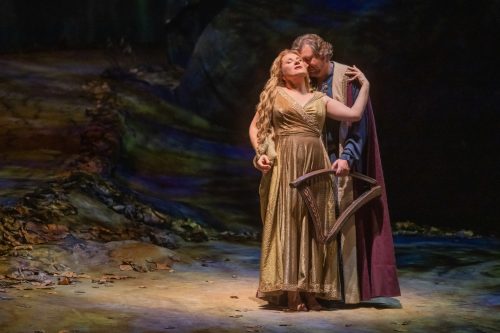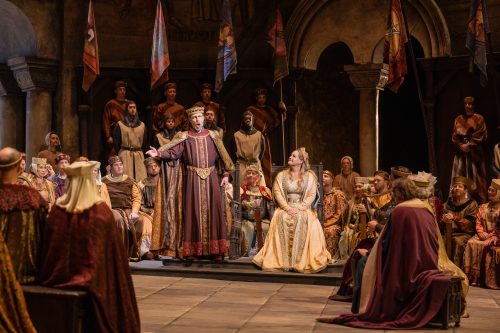United States Wagner, Tannhäuser: Soloists, Refrain and Orchestra of the Metropolitan Opera, New York / Sir Donald Runnicles (conductor). Metropolitan Opera, New York, 6.12.2023. (TM)

Manufacturing:
Path – Otto Schenk
Revival director – Stephen Pickover
Units – Günther Schneider-Siemssen
Costumes – Patricia Zipprodt
Lighting – Gil Wechsler
Choreographer – Norbert Vesak
Refrain grasp – Donald Palumbo
Forged:
Venus – Ekaterina Gruberova
Tannhäuser – Andreas Schager
Younger Shepherd – Maureen McKay
Landgraf Hermann – Georg Zeppenfeld
Walther von der Vogelweide – Kyle van Schoonhoven
Biterolf – Le Bu
Wolfram von Eschenbach – Christian Gerhaher
Heinrich der Schreiber – Tony Stevenson
Reinma von Zweiter – Harold Wilson
Elisabeth – Elza van den Heever
Pages – Marcus Agrippa, Ariadne Chan-Miller, Davida Dayle, Mila DiPolo, Alexandra Niatsetskaya, Casey Schopflocher, Andrea Wang, Joelle Wee
Three Graces – Emery LeCrone, Ana Luiza Luizi, Sarah Weber-Gallo
Might there be one thing like a Tannhäuser ‘curse’? Wagner fretted till the top of his life about find out how to enhance his first opera impressed by medieval German sources. Like a beckoning Venus, the work tempted him at numerous factors in his life to return and tinker away at what he perceived as its imperfections. Wagner’s most important revision, long-established for his operatic debut in Paris in 1861, spurred essentially the most humiliating fiasco of his mature profession – not due to the ‘content material’ however due to protests partly associated to Napoleon III’s insurance policies involving the Austrian Empire.
One other protest, additionally unrelated to the opera’s exploration of the strain between erotic and non secular love, quickly halted the opening evening of the Met’s present revival of the manufacturing, initially staged for the corporate by Otto Schenk in 1977. As has been broadly reported, the local weather activists referred to as Extinction Rebel staged a protest that stalled the efficiency halfway by way of the second act. (A disruption by pro-Palestinian demonstrators may need been much less shocking, no less than to these acquainted with the reception historical past of Tannhäuser – particularly, with the opera’s pivotal half in inspiring Theodor Herzl whereas writing his pamphlet The Jewish State.)
Fortunately, the efficiency I attended was allowed to unfold with out interference. Certainly, removed from exhibiting any signal of a curse, this account made a persuasive case for a piece that tends to be undervalued throughout the Wagner canon due to its proximity to the grand opera conventions the composer would later tear aside.
Schenk’s tradition-respecting manufacturing is anchored round an try and evoke the medieval German setting specified by Wagner – in different phrases, the nineteenth-century Romantic picture of the interval of troubadours and courtly romance. As seen on this revival, the manufacturing juxtaposes a visible feast of resplendent costumes and architectural illusionism, the setting for the grand spectacle of the troubadour contest on the heart of Tannhäuser, with the shadow-covered thriller of the panorama surrounding Wartburg Fortress and the mossy grottos of the supernatural Venusberg. It’s in these areas that the stakes relating to the title protagonist’s redemption play out.
The truth that the curtain stays closed for the Overture, with none stage fuss to interpret the music, provides a good indication that we’re heading right into a ‘typical’ manufacturing. When it opens, the Venusberg is revealed as an obscurely lit, multilevel paradis artificiel. Norbert Vesak’s choreography depicting the orgy underneath manner appears curiously decorous and well-behaved as compared with Wagner’s overcharged chromaticism and galloping rhythms.
A really lengthy, wordless stretch passes earlier than the doorway of any of the principle characters. The absence of directorial intervention (or protest) to regulate the dramaturgy as laid out by Wagner leaves ample room for conductor Donald Runnicles and the superb Met Orchestra to ascertain the coordinates of the opera from the pit. Certainly, Runnicles’s insights into the rating complement a wonderfully well-balanced and incisively characterised forged of principals. Within the efficiency I attended, musical values not solely prevailed however got scope to amplify and develop on the drama. Already with the Overture, Runnicles confirmed a eager sympathy with Wagnerian structure, constructing factors of stress fastidiously and accentuating how polarized are the musical environments wherein Tannhäuser lives and breathes.
In line with the musicologist and gambist Laurence Dreyfus (in his intriguing e-book Wagner and the Erotic Impulse), the composer’s status as a provocateur was initially related along with his unprecedented means to translate want and erotic longing into music, particularly in Tannhäuser. Runnicles tapped into the sense of destabilizing shock that accompanies the doorway of the Venusberg music, however on this account he appeared much less occupied with Wagner as sonic revolutionary than within the non secular languor and striving expressed not solely by Tannhäuser however by Elisabeth and Wolfram.
At instances, it was as if Runnicles had uncovered in Tannhäuser a proto-Parsifal – nowhere extra so than within the third act, which grew to become the sustained spotlight of the night. He formed its prelude right into a tone poem of tormented pilgrimage – halting gestures conveyed the repentant singer’s painful sense of non secular desolation – after which traced the lengthy arc, with meticulous element every step of the best way, to Tannhäuser’s miraculous but inevitable redemption. (Wagner himself had no persistence with those that needed to learn this as a conventionally Christian, pious decision however had in thoughts one thing nearer to the longing ‘to transcend the senses’, as Harold Clurman as soon as put it, that Tennessee Williams dramatized in such works as The Evening of the Iguana – coincidentally taking part in on the similar time in a brand new off-Broadway manufacturing by La Femme Theatre.) There have been already hints of this within the lingering melancholy of the primary choral entry within the lengthy opening scene. Runnicles underscored the distinction between the 2 levels of life in Venus’s realm: the erotic fever pitch and the over-satiated second of rumination post-orgy, which units Tannhäuser’s want to flee the Venusberg in movement.
Andras Schager, returning to the Met following his debut as Siegfried, introduced his enormous, untiring tenor to the title function. He was fast to qualify his reward of Venus with confessions of his dissatisfaction and, from the beginning, appeared sick comfy within the area of the goddess, sung with impatient, certainly all-too-human ardour and vulnerability by Ekaterina Gubanova. Schager portrayed the possession that overtakes Tannhäuser in the midst of the Wartburg music contest – so quickly after reaffirming his love for Elisabeth – with a plausible depiction of mania, and his obtuse pleasure till he lastly understands how deeply he has wounded her was particularly efficient. The tenor opened as much as the character’s fuller dimensionality in a harrowingly highly effective rendering of the ‘Rome Narration’, impressively writing over his youthful ardor with harsh tonal accents in essentially the most forward-looking passage of Wagner’s rating.

Elza van den Heever drew out the a number of layers of Elisabeth’s character together with her assured, gleaming higher vary and intensely expressive phrasing and performing. Her opening aria brimmed with a palpable pleasure in its bounding lyricism that had an antipode in her profoundly shifting remaining scene as she barely chased away doubt and dejection over Tannhäuser’s failure to return with new resolve. Most intriguing of all was the second of being wounded by the errant knight’s reward of Venus that van den Heever confirmed in Act II, making it clear that the opera just isn’t solely involved with Tannhäuser’s have to make sense of his expertise. She introduced out the sympathetic, even tender, aspect of her in any other case unbending father, Landgraf Hermann, sung with steely energy by Georg Zeppenfeld.
Making his Met debut as fellow troubadour Wolfram, Christian Gerhaher was among the many forged’s strongest belongings. The celebrated lieder interpreter mined each phrase for maximal affect with out indulging in mannerism. He appeared so invested in Wolfram’s worldview that his solo scenes grew to become new facilities of gravity: the painful longing and hard-earned solace he revealed in ‘O du mein holder Abendstern’ was definitely worth the worth of admission. Dramatically, his Wolfram conveyed persuasive concern for his good friend Tannhäuser and compassion for Elisabeth.
Different particularly notable contributions got here from Maureen McKay because the younger shepherd, the purifying first sound Tannhäuser hears upon his return to ‘actuality’, and Le Bu because the violence-prone Biterolf. Ready by Donald Palumbo, the Met Opera Refrain gave a first-rate efficiency of the in depth and integral choral elements.
Thomas Could
Featured picture: Georg Zeppenfeld (Hermann) and Elza van den Heever (Elisabeth) © Evan Zimmerman/Met Opera

